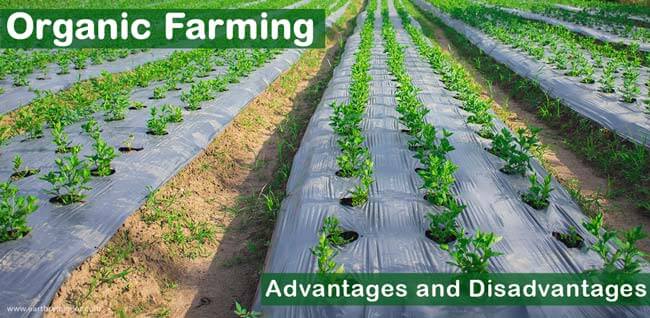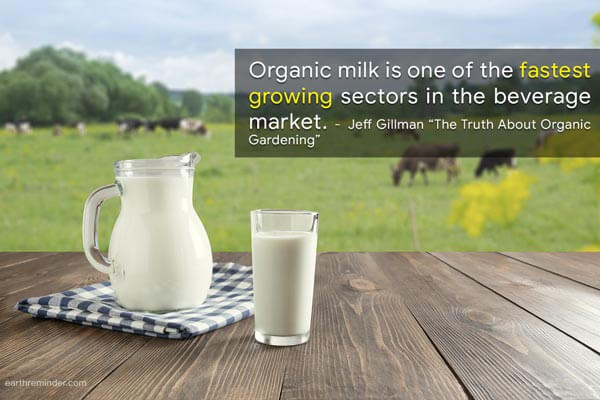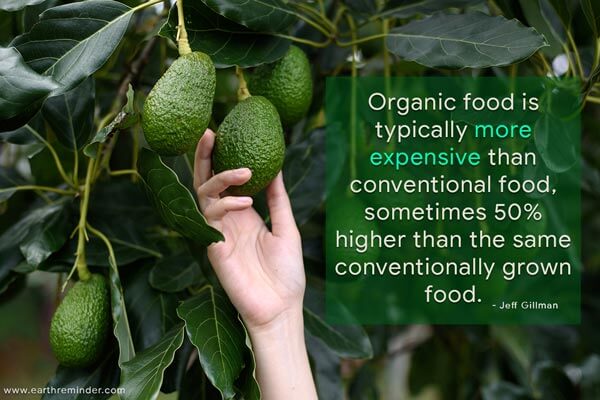Advantages and Disadvantages of Organic Farming
Learn Here Various Pros and Cons of Organic Farming
Advantages and disadvantages of Organic Farming
Organic farming is a method of growing crops, fruits, vegetables, etc. maintaining the quality of soil and ecological balance in the environment. It relies on local natural conditions of the surroundings rather than using inputs (like fertilizers, pesticides, etc.) that may lead to adverse effects on the environment.
Organic farming is a combined production system that involves tradition, innovation, and science to promote a good quality of life for us and benefits the ecosystem equally. It is an advanced technique that uses natural ways of cultivation to minimize pollution and wastage in the environment.
The IFOAM (International Federation of Organic Agriculture Movements) is a worldwide organization established in 1972. IFOAM initiated the movement to promote organic farming to protect the people and the environment from the negative impacts of chemical-based fertilizers, pesticides, growth hormones, etc.
Organic cultivation has been proved a beneficial production system to maintain our health. However, it has some drawbacks that show the negative aspects of these farming methods. Here, you will find out the pros and cons of organic farming.
Table of Contents
- 1 Advantages of Organic Farming
- 1.1 No chemicals for resistance to pests and diseases
- 1.2 Supports healthier soil and pollinators
- 1.3 Does not use genetically-modified food items
- 1.4 A healthy environment for the farmers to work
- 1.5 Organic farmers use natural fertilizers
- 1.6 Produces healthier food
- 1.7 Offers profitable niche crop opportunities to organic farmers
- 1.8 The Eco-friendly method of cultivation
- 2 Disadvantages of organic farming
Advantages of Organic Farming
Organic farming is becoming very popular worldwide. People have started using organic products; hence organic cultivation is trending rapidly. These are the major advantages of organic production methods that highlight its popularity.
No chemicals for resistance to pests and diseases
Organic farming creates natural levels of resistance to control pests and diseases instead of chemical-based pesticides. It eliminates the use of synthetic products to improve the productivity of the crops.
These farming methods permit only natural soil enhancement techniques rather than using fertilizers to maximize the yield.
Supports healthier soil and pollinators
It is one of the most crucial advantages of organic farming. The application of synthetic agricultural chemicals is one of the biggest problems for pollinators like bees. For example- Glyphosate and neonicotinoids are majorly responsible for devastating certain pollinators’ populations. Well, organic farming supports pollinators as it does not include chemical-based boosters.
At the same time, the soil in organic procedures is known to produce healthier items with higher antioxidants, omega-3 fatty acids, vitamin E, etc.
Does not use genetically-modified food items
One of the best parts of organic farming is that it does not use genetically modified food. The organic farmers are only permitted to cross-breed to encourage natural production levels. They are not permitted to use industry-based products to grow crops for market purposes.
A healthy environment for the farmers to work
Organic farming is beneficial not only for the health of the soil, food, and people who consume organic food but also beneficial for the farmers themselves. The organic farmers are not exposed to harmful synthetic ingredients as they manage their fields on a daily basis.
On the other hand, the farming procedures that involve chemical ingredients for cultivation are prone to develop health issues in the future such as neurological disease, headache, the myriad of bothersome symptoms, migraines, etc.
Organic farmers use natural fertilizers
Farming needs fertile soil to improve productivity. Organic farming methods improve soil fertility by using natural fertilizers prepared at the farming location, unlike conventional farming. The natural fertilizers used in organic processes help to encourage better yield.
Conventional farming uses chemical-based fertilizers that eventually destroy the fertility of the soil. Organic farmers use various methods to maintain the fertility of the soil—for example- crop rotation, green manure, composting, worm farming, etc. Therefore, this involves various advantages of organic farming.
Produces healthier food
Organic farming is a natural process of producing food, hence the nutrition level of this food is quite high as compared to food produced through conventional farming. Since the fruits and vegetables grown through organic methods take a long time to flourish, hence it is obvious that they are much tastier and nutritious.
For example- Peaches grown in organic farms taste much better as it contains higher polyphenol.
In short, it can be said that organic farming relies on quality production, whereas conventional farming believes in quantity production.
Offers profitable niche crop opportunities to organic farmers
Organic farming provides a very good opportunity to commence diversifying the products that we cultivate every year. Conventional farmers rely on cash crops to earn profits. For example, we cultivate Soybean and corn as major cash crops to earn great profits.
Organic farmers can grab this opportunity to grow various food items that can be sold throughout the year. For example, – Heirloom crops are great opportunities for organic farmers that taste much better and are nutritious at the same time. Even the seeds of heirloom crops are quite affordable than hybrid ones.
The Eco-friendly method of cultivation
If we look at the present scenario, then environmental protection is our basic priority. No matter which field we belong to but the important thing is that our every approach should be eco-friendly. Talking about farming processes, organic farming benefits the climate as it stores carbon in the soil.
It helps to minimize energy usage as the methods require physical labour more often than mechanical equipment. It also reduces the emission of greenhouse gases helping the ecosystem.
Disadvantages of organic farming
Although organic farming is beneficial for our health and environment, it also has some disadvantages as well. The cons of organic procedures mainly include these problems.
Expensive food items
One of the major disadvantages of organic farming is that organic food is more expensive than the food produced through the conventional farming method.
High production cost
Production cost in organic farming is quite higher as it requires more manpower. We can also associate it with inefficient marketing as distribution along with production is minimal than conventional farming.
Rarely subsidized farming method.
Any kind of subsidies does not offer most of the organic farmers. Without any subsidy, there will always be a huge risk involved in organic procedures such as weather changes or crop failure, etc.
Insufficient knowledge & skills
The organic farmers should have sufficient knowledge and skills about localized soil systems, meteorology, ecology, and other factors that influence crop growth. Without the proper knowledge, an individual organic farmer will be unable to protect his crop in critical stages that may arise while farming processes.
The crop is susceptible to illness.
The crops are easily susceptible to illness that may slow down the production. Organic foods have a shorter shelf life as compared to conventional food. The reason is that we do not treat the organic food materials with waxes or preservatives, unlike conventional methods, to store it for a long time.
Low yield
Organic farming is unable to fulfil the world’s demand for food to survive. It may lead to starvation in the countries that are producing enough food for the survival of their population.
Rigorous certification procedure
Organic farms have to go through tough certification processes. Also, it involves a certain certification amount. It is mandatory to meet organic standards. If an organic farm fails to meet these standards, it may have to face the consequences.
Organic farming is a better choice for the environment as it helps to minimize the pollution level. At the same time, it protects us from the side-effects of harmful chemicals used in conventional farming methods.
Organic products are much healthier as grown in natural conditions through natural methods. It provides healthy nutrients, minerals, vitamins, proteins, fibres, etc. to us, simultaneously, it helps to maintain the environmental sustainability.
So, these are some advantages and disadvantages of organic farming through which we can develop more effective technologies so that they can limit its demerits.


